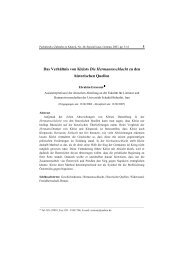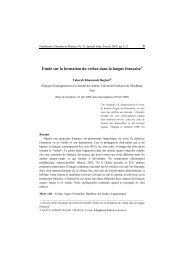Phonological Metathesis in Persian: Synchronic, Diachronic, and the ...
Phonological Metathesis in Persian: Synchronic, Diachronic, and the ...
Phonological Metathesis in Persian: Synchronic, Diachronic, and the ...
You also want an ePaper? Increase the reach of your titles
YUMPU automatically turns print PDFs into web optimized ePapers that Google loves.
26 Pazhuhesh-e Zabanha-ye Khareji, No. 56, Spr<strong>in</strong>g 2010<br />
1.Introduction<br />
Before <strong>the</strong> 1990s, despite <strong>the</strong> fact that teachers had always constituted one of <strong>the</strong><br />
ma<strong>in</strong> r<strong>in</strong>gs of <strong>the</strong> educational cha<strong>in</strong>, <strong>the</strong>y had been neglected to a large extent <strong>in</strong> <strong>the</strong><br />
research agenda. However, <strong>in</strong> recent years, with <strong>the</strong> postulation of postmethod<br />
pedagogy which empowers language teachers “to <strong>the</strong>orize from <strong>the</strong>ir practice <strong>and</strong><br />
practice what <strong>the</strong>y <strong>the</strong>orize” (Kumaravadivelu, 2001, p. 541) <strong>and</strong> critical pedagogy<br />
which considers teachers as “transformative <strong>in</strong>tellectuals” (Pennycook, 1989, p.<br />
613), more attention has been paid to <strong>the</strong>m. Consequently, some researchers have<br />
<strong>in</strong>vestigated different characteristics of language teachers such as <strong>the</strong>ir pedagogical<br />
knowledge base (e.g., Watzke, 2007), professional development (e.g., Ross &<br />
Bruce, 2007), <strong>and</strong> identity (e.g., Tsui, 2007) which affect teachers’ classroom<br />
practices <strong>and</strong> subsequently students’ achievement.<br />
One of <strong>the</strong> features that has absorbed a good deal of attention recently is<br />
teachers’ sense of self-efficacy which is a crucial parameter <strong>in</strong> determ<strong>in</strong><strong>in</strong>g teachers’<br />
op<strong>in</strong>ion about <strong>the</strong>ir job, <strong>the</strong>ir classroom activities, <strong>and</strong> <strong>the</strong>ir <strong>in</strong>fluence on students’<br />
outcomes. Research shows that teachers with a strong sense of efficacy enjoy higher<br />
levels of job satisfaction (Caprara et al., 2003; Caprara et al., 2006;Tschannen-<br />
Moran & Hoy, 2002), have stronger commitment to teach<strong>in</strong>g (Evans & Tribble,<br />
1986; Ware & Kitsantas, 2007), <strong>and</strong> are less vulnerable to burnout (Brouwers &<br />
Tomic, 2000; Shaalvik & Shaalvik, 2007). In addition, efficacious teachers create a<br />
better learn<strong>in</strong>g atmosphere for <strong>the</strong>ir students (Deemer, 2004; Gencer & Cakiroglu,<br />
2007; Woolfolk & Hoy, 1990; Yost, 2002), <strong>and</strong> are more <strong>in</strong>novative <strong>in</strong> <strong>the</strong><br />
application of new teach<strong>in</strong>g methods (Wer<strong>the</strong>im & Leyser, 2002). Greater efficacy<br />
also helps teachers use <strong>the</strong>ir class time as best as <strong>the</strong>y can (Gibson & Dembo, 1984),<br />
set high st<strong>and</strong>ards for <strong>the</strong>mselves <strong>and</strong> persist <strong>in</strong> <strong>the</strong> face of obstacles (Ross & Bruce,<br />
2007), foster stronger collegial ties (Friedman & Kass, 2002), <strong>and</strong> enhance students’<br />
achievement (Caprara et al., 2006; Herman, 2000; Midgley, et al., 1989; Ross, 1992;<br />
Shaughnessy, 2004;Tournaki & Podell, 2005;Wallik, 2002). So, it seems that <strong>the</strong><br />
stronger a teachers’ sense of efficacy, <strong>the</strong> more qualified s/he will be.<br />
On <strong>the</strong> o<strong>the</strong>r h<strong>and</strong>, two of <strong>the</strong> most important criteria used by recruiters to






